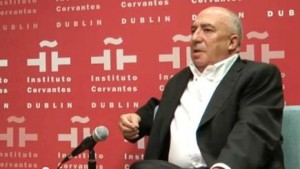Blog del Instituto Cervantes de Dublín
Torre Martello
Audiolibro de la semana | Audiobook of the Week: Esta noche moriré
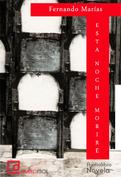 Con un inicio tan enigmático como “me suicidé hace dieciséis años”, Fernando Marías escribe una inquietante novela que te atrapará desde el primer momento. ¿Quieres escucharla en forma de audiolibro? Coge tu carnet de la biblioteca y haz click aquí.
Con un inicio tan enigmático como “me suicidé hace dieciséis años”, Fernando Marías escribe una inquietante novela que te atrapará desde el primer momento. ¿Quieres escucharla en forma de audiolibro? Coge tu carnet de la biblioteca y haz click aquí.
Delmar, un policía obsesionado en detener a un importante delincuente, se encuentra, 16 años más tarde de que consiga meterlo entre rejas, con que éste ha urdido un estratégico y macabro plan para vengarse. Aunque Delmar no es capaz, siquiera, de imaginar lo que le espera cuando recibe una larguísima carta. La estratagema del delincuente consiste en conseguir que acabe suicidándose, mostrándole hasta qué punto ha sido capaz de manipular su vida desde hace ya unos cuantos años.
This novel has an enigmatic beginning : “I committed suicide sixteen years ago”. Fernando Marías writes a disturbing novel that will hook you from the very first moment. Do you want to listen to it as an audiobook? Take your library card and make click here.
Delmar, a police man obsessed with arresting an important criminal, finds outs that he has created a strategic and macabre plan for revenge 16 years after putting him in jail. Delmar cannot imagine though what is coming when he receives a very long letter. The stratagem of the delinquent consists of making him commit suicide, showing him how he has been manipulating his life for quite a long time.
Elia Barceló, nuestra autora del mes en el Festival ISLA / Elia Barceló, our author of the month
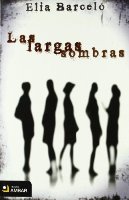 Elia Barceló (Alicante, 1957) estará con nosotros en el Festival ISLA de Literatura los días 2 y 3 de noviembre. Por eso, y para que conozcas un poco mejor su obra, la hemos seleccionado como autora del mes de noviembre en nuestra biblioteca.
Elia Barceló (Alicante, 1957) estará con nosotros en el Festival ISLA de Literatura los días 2 y 3 de noviembre. Por eso, y para que conozcas un poco mejor su obra, la hemos seleccionado como autora del mes de noviembre en nuestra biblioteca.
Elia Barceló reside en Austria desde 1981 donde es profesora de literatura hispánica.
Su campo de investigación es la literatura fantástica, de ciencia ficción y de terror, así como la narrativa argentina y cubana del siglo XX, la novela negra y la literatura juvenil en España. Se la considera una de las escritoras más importantes, en lengua castellana, del género de la ciencia-ficción, junto con la argentina Angélica Gorodischer y la cubana Daína Chaviano. Las tres forman la llamada “trinidad femenina de la ciencia-ficción en Hispanoamérica”.
Ha publicado novelas, ensayo y unos cuarenta relatos. Parte de su obra ha sido traducida al francés, italiano, alemán, catalán, inglés, griego, húngaro, holandés, danés, noruego, sueco y esperanto.
Elia Barceló (Alicante, 1957) is our author of the month in November. She will be with us in the ISLA Literary Festival the 2nd and the 3rd of November, so you have a good chance to know better her literary works.
She lives in Austria since 1981 where she teaches Spanish Literature. Her field of activity is Fantastic Literature, Science Fiction and Horror. She´s also interested in the Argentinian and Cuban narrative of the XX century, crime fiction and books for children and young adults.
She has published novels, essays and over forty short-stories. Part of her work has been translated into French, Italian, German, Catalan, English, Greek, Hungarian, Dutch, Danish, Norgewian and Esperanto.
Cine | Film Screening: Tango
Today is the last session of the Argentinian Film Series with the screening of the critically aclaimed film Tango by Carlos Saura. You can enjoy it at 6pm at Café Literario.
Set in Buenos Aires, the film tells the story of director Mario Suarez’s quest to make the ultimate tango film. Lonely after his wife has left him, Mario must find the themes that will hold the film together, while simultaneously permitting his musicians and dancers the freedom of expression that is necessary to satisfy the tango-hungry Argentine audience. Things become complicated when Mario falls in love with Elena, a beautiful and talented young dancer who is the girlfriend of the powerful and dangerous Angelo Larroca, an investor in the picture.
Hoy leemos con | Today we are reading with: Elia Barceló, Kevin Barry, Christopher Domínguez Michael, Keith Ridgway and María Negroni
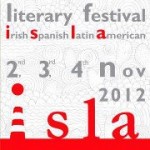 Ya solo quedan tres días para que de comienzo el esperado Festival ISLA de Literatura. Dentro de su programación, el sábado 3 de noviembre podremos disfrutar de un recital poético que dará comienzo a las tres y media de la tarde en nuestro Café Literario.
Ya solo quedan tres días para que de comienzo el esperado Festival ISLA de Literatura. Dentro de su programación, el sábado 3 de noviembre podremos disfrutar de un recital poético que dará comienzo a las tres y media de la tarde en nuestro Café Literario.
Elia Barceló, Kevin Barry, Christopher Domínguez Michael, Keith Ridway y María Negroni compartirán sus mejores textos con los asistentes al acto y unirán sus voces a este festival. La presentación, en este caso, correrá a cargo de Lorraine Kelly, de la Universidad de Galway (National University of Ireland). Pero, ¿quiénes son estos autores?, ¿no los conoces todavía?.
Elia Barceló (Alicante, España, 1957) ha publicado novelas policíacas, históricas, de ciencia ficción y género fantástico para adultos, así como novelas para jóvenes y ensayos. Ha sido traducida a diecisiete idiomas, entre ellos el inglés. Sus novelas traducidas al inglés hasta la fecha son: Corazón de tango (2007) (Heart of Tango, 2010) y El secreto del orfebre (2003) (The Goldsmith’s Secret, 2011).
Kevin Barry (Limerick). Su primer libro de relatos,There are Little Kingdoms, ganó el Premio Rooney de Literatura Irlandesa en 2007. Ha escrito sobre viajes y literatura para The Guardian, The Irish Times, The Sydney Morning Herald y muchas otras publicaciones. Su primera novela, City of Bohane (2011) ha sido galardonada en Reino Unido con el Authors’ club Best First Novel Award, que premia a la mejor primera novela del año.
Christopher Domínguez Michael (Ciudad de México, México, 1962), historiador y ensayista, es uno de los más conocidos críticos literarios hispanoamericanos. Es autor de numerosas publicaciones, siendo su última publicación Profetas del pasado. Quince voces sobre la historiografía de México (2011). Su Diccionario crítico de la literatura mexicana, 1955–2005 ha sido traducido y actualizado al inglés en 2012.
Keith Ridgway (Dublín, Irlanda, 1965). Su primera obra de ficción fue Horses (1997), a la que siguieronThe Long Falling (1998), Standard Time (2000); un libro de relatos, The Parts (2003); Animals (2006) yGoo Book (2011). Su última novela publicada esHawthorn & Child (2012). Ha recibido numerosos premios, entre ellos el Prix Femina Etranger y el Prix Premier Roman en París en 2001 por The Long Fallingbajo el título en francés Mauvais Pente, y el premio Rooney de literatura irlandesa en 2001. Las obras de Ridgway han sido traducidas a varios idiomas entre otros, el español.
María Negroni (Rosario, Argentina, 1951) es poeta, ensayista y novelista. Como poeta, ha publicado, entre otros libros: El viaje de la noche, Arte y Fuga,La Boca del Infierno y Cantar la nada. También ha publicado varios libros de ensayos y dos novelas. Su libro Islandia recibió el premio del PEN American Center en Nueva York al mejor libro de poesía en traducción del año (2001) y Galería Fantástica recibió el Premio Internacional de Ensayo de Siglo XXI (México). Su obra ha sido traducida al inglés, francés, sueco e italiano.
This event of ISLA Literary Festival will be an outstanding poetry reading in November 3rd at 3:30 at Café Literario.
Authors will read a selection of some of their best work in their original language in this poetry reading. Introduced by: Lorraine Kelly (NUI Galway).
Elia Barceló (Alicante, Spain, 1957) has published crime, historical, science fiction and fantastic novels for adults, as well as young adult books and essays. Her work has been translated into several languages, Spanish between others. Her novels translated into English are: Corazón de tango (2007), translated into English under the name Heart of Tango (2010) andThe Goldsmith’s Secret (2011), a translation of El secreto del orfebre (2003).
Kevin Barry was born in Limerick and now lives in Sligo. His first collection of short stories, There Are Little Kingdoms, won the Rooney Prize for Irish Literature in 2007. He has written about travel and literature for The Guardian, The Irish Times, The Sydney Morning Herald and many other publications. His debut novel City of Bohane (2011) recently won the Authors’ Club Best First Novel award in Britain.
Christopher Domínguez Michael (Mexico City, Mexico, 1962) is a historian and essayist, and also one of the most famous Hispanic-American literary critics. He is the author of several works, being his latest novel Profetas Del Pasado. Quince Voces Sobre La Historiografía De México was published in 2011. Since 2010 he has also worked as associate researcher at the Colegio de México. His workDiccionario Crítico de la Literatura Mexicana, 1955-2005 (Critical Dictionary of Mexican Literature, 1955–2010) has been translated into English and was updated in 2012.
María Negroni (Rosario, Argentina, 1951) is a poet, essayist and novelist. She has published numerous poetry books: Islandia, El viaje de la noche, Arte y Fuga, La Boca del infierno and Cantar la nada, to mention just a few. She has also published various essays collections and two novels. Her book Islandiareceived the 2001 PEN American Center Award for best book of poetry in translation. She was awarded the 21st Century International Essay Prize (Mexico) for her book Galería Fantástica. Her work has been translated into English, French, Swedish and Italian.
Keith Ridgway (Dublin, 1965). His first fictional prose Horses was published in 1997, followed by The Long Falling (1998), Standard Time (2000). A collection of short fiction, The Parts (2003), Animals(2006), Goo Book (2011) and Hawthorn & Child(2012). He has received numerous awards such as the Prix Femina Etranger and the Prix Premier Roman in Paris in 2001 for The Long Falling, under its French title of Mauvaise Pente, and The Rooney Prize For Irish Literature in 2001. His work has been translated into several languages and has been published in Spain, between other countries.
Mesa redonda: Cruzando fronteras: Poesía en la maleta | Round table discussion: Crossing frontiers: Poetry in the suitcase
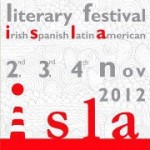 Le invitamos a una interesante discusión literaria que tendrá lugar el 3 de Noviembre a las 14:00, Festival Literario ISLA.
Le invitamos a una interesante discusión literaria que tendrá lugar el 3 de Noviembre a las 14:00, Festival Literario ISLA.
La poesía llega al festival ISLA con los autores Omar Pérez, Diego Valverde Villena, Máighréad Medbh y Lorna Shaughnessy. Cuatro formas de construir desde lo poético para enriquecer el panorama contemporáneo. Modera: Catherine O’Leary (NUI Maynooth)
Omar Pérez (La Habana, Cuba, 1964) es poeta, ensayista y traductor, además de periodista, crítico de teatro y cine, editor y locutor de radio. Su última publicación es la colección de ensayos El corazón mediterráneo (2011). Como poeta ha publicado Algo de lo sagrado (1996), ¿Oíste hablar del gato de pelea? (1999), Canciones y Letanías (2002) y Lingua Franca (2009). En inglés ha publicado Something of the Sacred (2007), traducción de Algo de lo sagrado, a cargo de Kristin Dykstra y Did you hear about the fighting cat? (2010).
Diego Valverde Villena (Lima, Perú, 1967). Poeta español y peruano, de ascendencia boliviana. En 2011 publicó su libro de poemas Un segundo de vacilación. Ha traducido obras de Conan Doyle, Kipling, John Donne, Ezra Pound, Valery Larbaud, Nuno Júdice, E.T.A. Hoffmann y Paul Celan, entre otros. Sus poemas aparecen en numerosas antologías y han sido traducidos a varios idiomas, entre ellos al irlandés. Entre sus principales obras de poesía se encuentran: El difícil ejercicio del olvido(1997), No olvides mi rostro (2001) y El espejo que lleva mi nombre escrito (2006).
Máighréad Medbh (Condado de Limerick, Irlanda) ha publicado cinco colecciones de poesía y un audiolibro. Fue pionera de la performance poética en Irlanda en los años 90. Su colección más reciente esTwelve Beds for the Dreamer (2010). Máighréad ha sido publicada en una gran variedad de antologías y ha escrito versiones de poemas gallegos para dos antologías recientes editadas por Manuela Palacios de la Universidad de Santiago de Compostela. Durante el festival, Máighréad presentará una mezcla de obras nuevas y algunas de Twelve Beds for the Dreamer y When the Air Inhales You.
Lorna Shaughnessy (Belfast, Irlanda del Norte, 1961) es poeta, traductora y profesora de Lengua Española en la Universidad Nacional de Irlanda, Galway. Ha publicado dos libros de poemas, Torching the Brown River (2009) y Witness Trees (2011) y dos traducciones de poesía contemporánea mexicana,Mother Tongue. Selected Poems by Pura López Colomé y If We Have Lost our Oldest Tales, de María Baranda (2006). Su traducción de The Disappearance of Snow de Manuel Rivas fue publicada en 2012.
You’re invited to an interesting literary discussion in November 3rd at 14:00, ISLA Literary Festival.
Poetry arrives at ISLA festival with authors Omar Pérez, Diego Valverde Villena, Máighréad Medbh and Lorna Shaughnessy. Four ways to build from poetry to enrich contemporary work. Chaired by Catherine O’Leary (NUI Maynooth).
(Havana, Cuba, 1964) is a poet, essayist and translator, as well as a journalist, theatre and film critic, editor and radio presenter. His last publication was the collection of essays El corazón mediterráneo (2011). As a poet he publishedAlgo de lo sagrado (1996), ¿Oíste hablar del gato de pelea? (1999), Canciones y Letanías (2002) andLingua Franca (2009). In English publishedSomething of the Sacred (2007), the translation ofAlgo de lo Sagrado by Kristin Dykstra, and Did You Hear About The Fighting Cat? (2010).
Diego Valverde Villena (Lima, Peru, 1967) is a Spanish and Peruvian poet of Bolivian descent. In 2011 he published his book of poems Un segundo de vacilación. He has translated, among others, works of Conan Doyle, Joseph Rudyard Kipling, John Donne, Ezra Pound, Valery Larbaud, Nuno Júdice, E.T.A. Hoffmann and Paul Celan. His poems appear in many compilations and have been translated into several languages, including Irish. His most famous works in poetry are El difícil ejercicio del olvido (1997), No olvides mi rostro (2001) and El espejo que lleva mi nombre escrito (2006).
Máighréad Medbh (Co. Limerick) has five published poetry collections and an audio CD. She was a pioneer of performance poetry in Ireland in the nineteen-nineties. Her most recent collection, Twelve Beds for the Dreamer was published in 2010. Máighréad has been published in a wide range of anthologies, and has written versions of Galician poems for two recent anthologies edited by Manuela Palacios of Universidade de Santiago de Compostela. During the festival, Máighréad will be presenting a mix of new work and some from Twelve Beds for the Dreamer and When the Air Inhales You.
Lorna Shaughnessy (Belfast, Northern Ireland, 1961) is a poet, translator and lecturer in Spanish in the National University of Ireland, Galway. She has published two collections of poems, Torching the Brown River (2009) and Witness Trees (2011) and two translations of contemporary Mexican poetry,Mother Tongue: Selected Poems by Pura López Colomé and If We Have Lost our Oldest Tales by María Baranda, (2006). Her translation of Manuel Rivas’ The Disappearance of Snow, was published in 2012.
Mesa Redonda: Escritores sin escrúpulos: Intimidad, violencia y humor en la literatura | Round table discussion: Writers without scruples: Intimacy, violence and humour in literature
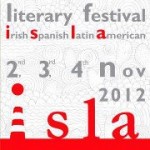 La primera actividad en el Festival Literario ISLA será una discusión literaria, que tendrá lugar el 3 de Noviembre a las 11:30 en el Café Literario.
La primera actividad en el Festival Literario ISLA será una discusión literaria, que tendrá lugar el 3 de Noviembre a las 11:30 en el Café Literario.
Temas como la identidad y la memoria, la violencia o el humor serán tratados por los invitados Ita Daly, Christopher Domínguez Michael, Rafael Gumucio y Catherine Dunne, con la moderación de Ciaran Cosgrove (Trinity College Dublin).
Ita Daly (Drumshanbo, Leitrim, Irlanda) ha publicado cinco novelas, una colección de cuentos y dos libros infantiles. Ha recibido el premio Hennessy Literary Award y el Irish Times Short Story Award. Su obra ha sido traducida al sueco, danés, japonés, italiano y alemán y sus relatos cortos han aparecido en revistas de Irlanda, Inglaterra y Estados Unidos. Uno de sus libros de relatos, The Lady With the Red Shoes, forma parte del plan de estudios de las escuelas de secundaria alemanas.
Christopher Domínguez Michael (Ciudad de México, México, 1962), historiador y ensayista, es uno de los más conocidos críticos literarios hispanoamericanos. Es autor de numerosas publicaciones, siendo su última publicación Profetas del pasado. Quince voces sobre la historiografía de México (2011). Es miembro del Sistema Nacional de Creadores de Arte desde 1993. Su Diccionario crítico de la literatura mexicana, 1955–2005 ha sido traducido y actualizado al inglés en 2012.
Rafael Gumucio (Santiago, Chile, 1970) ha trabajado como periodista en numerosos diarios nacionales chilenos, españoles y en el New York Times. En 1995 publicó el libro de relatos Invierno en la Torre y Memorias Prematuras. Ha publicado también las novelas Comedia Nupcial, Los Platos Rotos y Páginas Coloniales. Su última novela es La Deuda (2009). Actualmente es Director del Instituto de Estudios Humorísticos de la Universidad Diego Portales y co-conductor de Desde Zero en Radio Zero.
Catherine Dunne (Dublín, 1954), estudió inglés y español en Trinity College de Dublín. Su primera novela, In the Beginning, fue publicada en 1997. Le siguió A Name for Himself, finalista del premio Kerry Fiction Prize. Ha publicado otras seis novelas, The Walled Garden (2000), Another Kind of Life (2003), Something Like Love (2006), At a Time Like This(2007), Set in Stone (2009), Missing Julia (2011) y el ensayo An Unconsidered People: The Irish in Sixties London (2003). Sus novelas The Walled Garden (El jardín vallado) y A Name for Himself (Un nombre propio) han sido traducidas al español.
The first event in 3rd November of ISLA Literary Festival is a literary discussion, and it will take place at Café Literario at 11:30.
Topics such as identity and memory, violence or humour will be dealt with by guests Ita Daly, Christopher Domínguez Michael, Rafael Gumucio and Catherine Dunne, chaired by Ciaran Cosgrove (Trinity College Dublin).
Ita Daly (Drumshambo, Co. Leitrim) has published five novels, one collection of short stories and two books for children. She has won two Hennessy Literary Awards and an Irish Times Short Story Award. Her last novel, Unholy Ghosts (1997), was long listed for the International IMPAC Dublin Literary Award. Her work has been translated into Swedish, Danish, Japanese, Italian and German and her short stories have appeared in magazines in Ireland, England and America. Her short story collection The Lady With the Red Shoes (1980) is currently on the secondary school curriculum in Germany.
Christopher Domínguez Michael (Mexico City, Mexico, 1962) is a historian and essayist, and also one of the most famous Hispanic-American literary critics. He is the author of several works, being his latest novel Profetas Del Pasado. Quince Voces Sobre La Historiografía De México was published in 2011. He is a member of the Sistema Nacional de Creadores de Arte (National System for Art Creators) since 1993. His work Diccionario Crítico de la Literatura Mexicana, 1955-2005 (Critical Dictionary of Mexican Literature, 1955–2010) has been translated into English and was updated in 2012.
Rafael Gumucio (Santiago, Chile, 1970) has worked as a journalist for many Chilean and Spanish newspapers, as well as the New York Times. In 1995 he published the collection of short stories Invierno en la Torre and Memorias prematuras. He also published the novels Comedia Nupcial, Los Platos Rotos and Páginas Coloniales. His latest novel, La Deuda, was published in 2009. He now works as the director of the Institute for Humour Studies of the University Diego Portales and is co-conductor of Desde Zero at the radio station Zero. He received the Anna Seghers Award in Germany in 2002.
Catherine Dunne (Dublin, 1954). She studied English and Spanish at Trinity College, Dublin. Her first novel, In the Beginning, was published in 1997. A Name for Himself followed a year later, and was short listed for the Kerry Fiction Prize. She has published six further novels, The Walled Garden (2000),Another Kind of Life (2003), Something Like Love(2006), At a Time Like This (2007), Set in Stone(2009), Missing Julia (2011) and the non-fiction bookAn Unconsidered People: The Irish in Sixties London(2003). Her novels The Walled Garden (El jardín vallado) and A Name for Himself (Un nombre propio) have been translated into Spanish.
Audiolibro de la semana | Audiobook of the Week: En primera línea
Emoción para el audiolibro de esta semana: En primera línea escrito por el periodista Baltasar Magro. Para descargarlo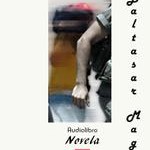 solo necesitas tu carnet de biblioteca y hacer click aquí.
solo necesitas tu carnet de biblioteca y hacer click aquí.
Beirut, 1982. Helena y Luis, dos corresponsales de Televisión Española, y Álex, novato periodista de la agencia EFE, viven de cerca el sitio a los últimos reductos palestinos y la tensión de la guerra del Líbano. Envueltos en la angustiosa atmósfera de la guerra, y en medio de la desolación, surge entre ellos una buena amistad que perdurará con el paso de los años.
La relación entre Luis, Helena y Álex, encuadrada en el mundo real de los medios de comunicación, constituye el eje esencial de esta novela.
El autor de esta trepidante novela perfila un relato intenso para describirnos los secretos de la profesión periodística con una fascinante trama que nos sumerge en los entresijos de la televisión. Baltasar Magro ha trabajado durante más de 30 años en diferentes cadenas como guionista de programas culturales y como director de diferentes espacios informativos, entre los que destaca el mítico Informe Semanal.
An exciting story for the audiobook of the week: En primera línea, written by journalist Baltasar Magro. To download it, just get your library card and press here!
Beirut, 1982. Helena and Luis work as correspondents for the Spanish National Broadcast and Alex is a new journalist working for EFE Press Agency. The three of them live first- hand the siege to the last Palestinian strongholds and the strains due to the war in Lebanon. Involved in the distressing atmosphere of war, a good friendship arises among them in the middle of desolation, lasting through the years.
The relationship between Luis, Helena and Alex, framed in the world of communication media, is the subject matter of this novel. Baltasar Magro outlines an intense story to describe the secrets of Journalism with a fascinating plot that immerses us in the secrets of television.
The author of this exciting novel has been working for over 30 years in different television broadcasters as screenwriter for cultural programmes and director of several news programmes, among which highlights the mythical “Informe Semanal”.
Hoy leemos con | Today we are reading with: Harry Clifton, Omar Pérez, Lorna Shaughnessy y Diego Valverde Villena
La segunda actividad del Festival ISLA es un estupendo recital poético que podrás disfrutar el 2 de noviembre a partir de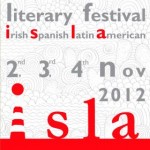 las 17:15 en el Café Literario.
las 17:15 en el Café Literario.
Estos cuatro poetas han seleccionado algunos de sus mejores poemas a los que pondrán su voz en este recital en versión original. Presenta: Bill Richardson (NUI Galway).
Harry Clifton (Dublín, 1952) ha vivido una parte importante de su vida fuera de Irlanda (Nigueria, Extremo Oriente, Italia…) De su estancia en Italia publicó sus memorias en prosa On the Spine of Italy. En 2004 regresó a Irlanda. Entre sus colecciones de poemas se encuentran The Desert Route: Selected Poems 1973-1988 y Secular Eden: Paris Notebooks 1994-2004. También es autor de una colección de ficción, Berkeley’s Telephone and Other Fictions(2000). Clifton fue nombrado Ireland Chair of Poetry en el 2010. Ha recibido también el premio de poesía Patrick Kavanagh y dos premios Arts Council Bursaries de literatura. Sus obras han sido traducidas a varias lenguas europeas.
Lorna Shaughnessy (Belfast, Irlanda del Norte, 1961) es poeta, traductora y profesora de Lengua Española en la Universidad Nacional de Irlanda, Galway. Ha publicado dos libros de poemas, Torching the Brown River (2009) y Witness Trees (2011) y dos traducciones de poesía contemporánea mexicana,Mother Tongue: Selected Poems by Pura López Colomé y If We Have Lost our Oldest Tales, de María Baranda (2006). Su traducción de The Disappearance of Snow de Manuel Rivas fue publicada en 2012.
Omar Pérez (La Habana, Cuba, 1964) es poeta, ensayista y traductor, además de periodista, crítico de teatro y cine, editor y locutor de radio. Su última publicación es la colección de ensayos El corazón mediterráneo (2011). Como poeta ha publicado Algo de lo sagrado (1996), ¿Oíste hablar del gato de pelea? (1999), Canciones y Letanías (2002) y Lingua Franca (2009). En inglés ha publicado Something of the Sacred (2007), traducción de Algo de lo sagrado, a cargo de Kristin Dykstra y Did you hear about the fighting cat? (2010).
Diego Valverde Villena (Lima, Perú, 1967). Poeta español y peruano, de ascendencia boliviana. En 2011 publicó su libro de poemas Un segundo de vacilación. Ha traducido obras de Conan Doyle, Kipling, John Donne, Ezra Pound, Valery Larbaud, Nuno Júdice, E.T.A. Hoffmann y Paul Celan, entre otros. Sus poemas aparecen en numerosas antologías y han sido traducidos a varios idiomas, entre ellos al irlandés. Entre sus principales obras de poesía se encuentran: El difícil ejercicio del olvido(1997), No olvides mi rostro (2001) y El espejo que lleva mi nombre escrito (2006).
The second event of the ISLA Festival will be an outstanding poetry reading on November 2nd at 5.15pm at Café Literario.
These four poets will be reading a selection of some of their best poems in their original language in this poetry reading. Introduced by Bill Richardson (NUI Galway)
Harry Clifton (Dublin, 1952) has spent great part of his life outside of Ireland (Nigeria, Far East, Italy…). He documented the time spent in Italy in his prose memoir On the Spine of Italy. In 2004, he returned to Ireland. His collections of poems include The Desert Route: Selected Poems 1973-1988 and Secular Eden: Paris Notebooks 1994-2004. He is also the author of a collection of fiction, Berkeley’s Telephone and Other Fictions (2000). He was appointed as the Ireland Chair of Poetry in 2010. His other honors include the Patrick Kavanagh Poetry Award and two Arts Council Bursaries in Literature. His work has been translated into several European languages.
Omar Pérez (Havana, Cuba, 1964) is a poet, essayist and translator, as well as a journalist, theatre and film critic, editor and radio announcer. His last publication was the collection of essays El corazón mediterráneo (2011). As a poet he publishedAlgo de lo sagrado (1996), ¿Oíste hablar del gato de pelea? (1999), Canciones y Letanías (2002) andLingua Franca (2009). In English he publishedSomething of the Sacred (2007), the translation ofAlgo de lo Sagrado by Kristin Dykstra, and Did You Hear About The Fighting Cat? (2010).
Lorna Shaughnessy (Belfast, Northern Ireland, 1961) is a poet, translator and lecturer in Spanish in the National University of Ireland, Galway. She has published two collections of poems, Torching the Brown River (2009) and Witness Trees (2011) and two translations of contemporary Mexican poetry,Mother Tongue: Selected Poems by Pura López Colomé and If We Have Lost our Oldest Tales by María Baranda, (2006). Her translation of Manuel Rivas’ The Disappearance of Snow, was published in 2012.
Diego Valverde Villena (Lima, Peru, 1967) is a Spanish and Peruvian poet of Bolivian descent. In 2011 he published his book of poems Un segundo de vacilación. He has translated, among others, works of Conan Doyle, Joseph Rudyard Kipling, John Donne, Ezra Pound, Valery Larbaud, Nuno Júdice, E.T.A. Hoffmann and Paul Celan. His poems appear in many compilations and have been translated into several languages, including Irish. His most famous works in poetry are El difícil ejercicio del olvido (1997), No olvides mi rostro (2001) and El espejo que lleva mi nombre escrito (2006).
Film screening | Cine: Las acacias
Todavía estás a tiempo de disfrutar del estupendo ciclo del cine argentino más actual. La película de hoy es Las acacias y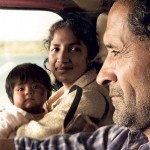 se proyectará a las seis en el Café Literario.
se proyectará a las seis en el Café Literario.
La ruta que une Asunción de Paraguay con Buenos Aires. Un encargo: camionero debe llevar a una mujer desconocida. La mujer no llega sola, trae una niña en brazos. 1.500 kilómetros de viaje por delante.
La ópera prima de Pablo Giorgelli (…) presenta un conflicto menor que progresa a medida que los minutos transcurren, para terminar convirtiendo una historia mínima en una lección del más puro cine (en Escribiendo Cine).
Película ganadora de la Cámara de Oro en el último Festival de Cannes y premiada en San Sebastián, Londres, Biarritz y Bratislava, entre otros.
You can still enjoy the best of Argentinian cinema thanks to the film series that we show in October. The film that will be shown today is Las Acacias. The screening will be at 6pm at Cafe Literario.
Rubén is a lonely truck driver who has been covering for years the motorway from Asunción del Paraguay to Buenos Aires, carrying wood. However, today’s journey will be different. This morning, in a motorway stop near Asunción, Jacinta shows up an hour later to begin a journey by track which is going to take her to Buenos Aires. What’s more, Rubén finds out at that very moment that little Anahí, who’s 8 months old, will travel with them- It is not the best beginning. As kilometres go by, the relationship between Rubén and Jacinta will grow. They will slowly meet and sip into each other’s soul. None of them talks much about their lives. None asks much either. It’s a few word journey but it is not a silent one.
Awarded the Golden Camera at the Cannes Film Festival and other prizes in San Sebastián, London, Biarritz and Bratislava, just to mention a few.
Mesa redonda: Literatura fantástica y poesía. De Cortázar a Beckett, pasando por Borges | Round Table: Poetry and fantastic literature. From Cortázar to Beckett, including Borges along the way
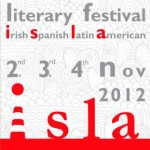 Abrimos el festival ISLA con esta mesa redonda en la que los invitados Elia Barceló, Harry Clifton y María Negroni hablarán sobre literatura fantástica y poesía, sus influencias y mucho más con Jean-Philippe Imbert (DCU). No te puedes perder esta cita el próximo día 2 de noviembre a las 16:00 horas en el Café Literario.
Abrimos el festival ISLA con esta mesa redonda en la que los invitados Elia Barceló, Harry Clifton y María Negroni hablarán sobre literatura fantástica y poesía, sus influencias y mucho más con Jean-Philippe Imbert (DCU). No te puedes perder esta cita el próximo día 2 de noviembre a las 16:00 horas en el Café Literario.
Elia Barceló (Alicante, España, 1957) ha publicado novelas policíacas, históricas, de ciencia ficción y género fantástico para adultos, así como novelas para jóvenes y ensayos. Ha recibido el Premio Gabriel 2007, galardón reservado para las más importantes personalidades del género fantástico en España. Ha sido traducida al francés, italiano, alemán, catalán, inglés, griego, húngaro, holandés, danés, noruego, sueco, croata, portugués, euskera, checo, ruso y esperanto. Sus novelas traducidas al inglés hasta la fecha son: Corazón de tango (2007), traducida al inglés como Heart of Tango (2010) y The Goldsmith’s Secret (2011), traducción de El secreto del orfebre (2003).
Harry Clifton (Dublín, 1952) ha vivido una parte importante de su vida fuera de Irlanda (Nigeria, Extremo Oriente, Italia…). De su estancia en Italia publicó sus memorias en prosa On the Spine of Italy. En 2004 regresó a Irlanda. Entre sus colecciones de poemas se encuentran The Desert Route: Selected Poems 1973-1988 y Secular Eden: Paris Notebooks 1994-2004. También es autor de una colección de ficción, Berkeley’s Telephone and Other Fictions(2000). Clifton fue nombrado Ireland Chair of Poetry en 2010. Ha recibido también el premio de poesía Patrick Kavanagh y dos premios Arts Council Bursaries de literatura. Sus obras han sido traducidas a varias lenguas europeas.
María Negroni (Rosario, Argentina, 1951) es poeta, ensayista y novelista. Como poeta, ha publicado, entre otros libros: Islandia, El viaje de la noche, Arte y Fuga, La Boca del Infierno y Cantar la nada. También ha publicado varios libros de ensayos y dos novelas. Ha traducido, entre otros, a Emily Dickinson, Louise Labé, Valentine Penrose, Georges Bataille, H.D., Charles Simic y Bernard Noël, y la antología de mujeres poetas norteamericanas La pasión del exilio(2007). Su libro Islandia recibió el premio del PEN American Center en Nueva York al mejor libro de poesía en traducción del año (2001) y Galería Fantástica recibió el Premio Internacional de Ensayo de Siglo XXI (México). Su obra ha sido traducida al inglés, francés, sueco e italiano.
The ISLA festival will kick off with this round table where guests Elia Barceló, Harry Clifton and María Negroni will discuss poetry and fantastic literature, its influences and much more with Jean-Philippe Imbert (DCU). This event will be held the 2nd of November at 4pm at our Café Literario.
Elia Barceló (Alicante, Spain, 1957) has published crime, historical, science fiction and fantastic novels for adults, as well as young adult books and essays. In 2007 she received the Gabriel Award, a prize for the most important personalities in the fantastic genre in Spain. Her work has been translated into French, Italian, German, Catalan, English, Greek, Hungarian, Dutch, Danish, Norwegian, Swedish, Croatian, Portuguese, Basque, Czech, Russian and Esperanto. Her novels translated into English are: Corazón de tango (2007), translated into English under the nameHeart of Tango (2010) and The Goldsmith’s Secret(2011), a translation of El secreto del orfebre (2003).
Harry Clifton (Dublin, 1952) has spent great part of his life outside of Ireland (Nigeria, Far East, Italy…). He documented the time spent in Italy in his prose memoir On the Spine of Italy. In 2004, he returned to Ireland. His collections of poems include The Desert Route: Selected Poems 1973-1988 and Secular Eden: Paris Notebooks 1994-2004. He is also the author of a collection of fiction, Berkeley’s Telephone and Other Fictions (2000). He was appointed as the Ireland Chair of Poetry in 2010. His other honors include the Patrick Kavanagh Poetry Award and two Arts Council Bursaries in Literature. His work has been translated into several European languages.
María Negroni (Rosario, Argentina, 1951) is a poet, essayist and novelist. She has published numerous poetry books: Islandia, El viaje de la noche, Arte y Fuga, La Boca del infierno and Cantar la nada, to mention just a few. She is also author of several essays and two novels. She has translated several poets: Emily Dickinson, Louise Labé, Valentine Penrose, Georges Bataille, H.D., Charles Simic and Bernard Noël, as well as the anthology of 20th century North American women poets La Pasión del Exilio (2007). Her book Islandia received the 2001 PEN American Center Award for best book of poetry in translation. She was awarded the 21st Century International Essay Prize (Mexico) for her bookGalería Fantástica. Her work has been translated into English, French, Swedish and Italian.
Interview with Ángel Guinda
Ángel Guinda: Being a Poet is Not a Profession, It’s a Possession
Interview with Ángel Guinda held on the 22nd October 2012 at the Dámaso Alonso Library of the Instituto Cervantes in Dublin in association with his participation in the literary reading “Useful poetry: commented reading”.
Ángel Guinda (Zaragoza, 1948) is best known for his poetry. In the early eighties, he published his collected poetry in Vida ávida, where the rawness of his words and a self-destructive nature stood out. In 1987, Ángel moved to Madrid, which gave way to a more existentialist style of poetry with titles likeConocimiento del medio, La llegada del mal tiempo and Biografía de la muerte. With the new Century, Guinda’s attempt to better communicate and connect with people, led to a more open and unified style of poetry. With Claro interior and Poemas para los demás, his work began to appeal to a wider audience. In 2010, he received the Premio de las Letras Aragonesas prize. Since then, he has published three poetry collections: Espectral (2011) Caja de lava (2012) andRigor Vitae (2013).
Carmen Sanjulián: —Ángel, you’ve been writing for many years. Do you remember your first poem?
Ángel Guinda: —I think my first poem was a ballad, when I was 12, to celebrate (I’m almost embarrassed to mention it) my stepsister’s First Communion.
Carmen Sanjulián: —Embarrased? Why?
Ángel Guinda: —Well, because of the way life has changed… They say, “If you’ve lived, you’ve seen it all”. When I was young, I was an altar boy, I had to study Greek and Latin. I went to mass and was Christian, Catholic, Apostolic and Roman, until I reached 30, which is when I lost my faith.
Carmen Sanjulián: —Things have changed a lot. You not only write poems, but also theorise about poetry and the role of the poet in society, which lead yout to publish poetic manifestos such as Poesía y subversión, Poesía útil, Poesía violenta, o El mundo del poeta. El poeta en el mundo. Why do you have this need to write, to reflect?
Ángel Guinda: —That´s a really interesting question. I began to theorise about poetry when I already had my own poetic style. I already knew where I wanted to go and roughly what voice I wanted to project. Then I started to ask myself the big questions, “What is the word?” I thought the word was about being alive, so I answered myself, “The word is a living thing”. I was self-evident and I explained this to my students. “What is a poet?” I argued, “Being a poet is not a profession, its a possession”. “What is a poem?” “What is poetry? I mean, I started to ask myself the fundamental questions in order to reaffirm my style and my own voice.
Carmen Sanjulián: —You wrote one of your manifestos at the Casa del Poeta in Trasmoz. You where the first guest and you began with a hunger strike. Has anything changed since then?
Ángel Guinda: —Very little, unfortunately. I remember that among the literary claims there was one in Euskadi that vindicated the poetry and the great Basque poets who hardly wrote anything in Basque, but in Spanish, like Blas de Otero or Gabriel Celaya – poets who did so much for the advent of freedom in Spain.
When I attended a tribute to Celaya, in the village where he was born, his widow, Amparo Gastón, was there, and I witnessed tomatoes being thrown at them, at the widows of Blas de Otero, Sabina de la Cruz… I crumbled. It seemed a terrible injustice to me. Apparently now there is more respect for the poetry of Gabriel Celaya and Blas de Otero, especially after the truce was called.
I also pushed, for example, for the opening of a Poet’s House in each of the autonomous communities of Spain, there´s still only one in Trasmoz, as the only centre for literary translation is in Tarazona. On top of this, I called for 0% VAT on literature. Although almost nothing has been achieved since then, it had some impact at the time and I felt great support from my literary colleagues and readers in general.
Carmen Sanjulián: —Paradox is a distinguishing element in your poetry, but it´s also an element that distinguishes you in life.
Ángel Guinda:—Yes, because as Cernuda said “It is not love that dies, but we ourselves”… I am eternally in love with life and I believe in the immortality of love but then I admit that I married four times. This is an example of paradox in my life, but there are many more…
Carmen Sanjulián: — Poets have been described as being cursed, is there such a thing as a poet who is blessed?
Ángel Guinda: —I think I´m blessed. Even though Ángel Crespo coined the term “Ángel Guinda, cursed poet” in a study about.my poetry. As a poet, I´m blessed.
Carmen Sanjulián: —How come?
Ángel Guinda: —Because I think I’m a good person. I want to be, and I think I am, a good guy. If we interpret being cursed as voluntarily choosing to be on the fringes of society, with little power and influence, then I am
Carmen Sanjulián: —You defend the idea of poetry as something useful. In what way has poetry helped you?
Ángel Guinda: —It has helped me in a lot of ways. It has helped me as a means of expression. For me, expressing yourself is part of being alive. When you have more and better ways of expressing yourself, you feel more alive.
I use poetry as a means of expression, of communication, of understanding and a way of looking at the world. Not only in terms of aesthetics but also in the way I face the world with a resilient attitude. Life is marvellous, that´s true, but life is very hard for everyone, it´s really challenging and feeling positive can be the contradiction to death.
Carmen Sanjulián: —This is one of the topics that you regularly visit.
Ángel Guinda: —Sure – life, death, the passing of time that erodes everything…
Carmen Sanjulián: —So you´re saying that poetry is useful. A few days ago I read that they´re thinking of making economics a compulsory subject in schools. Do you think they´ll ever make poetry compulsory?
Ángel Guinda: No, I don´t, unfortunately. It has nothing to do with looking out for our own interests, but unfortunately, no. I have given language and literature classes in secondary school and have tried to make my syllabus live up to the generation of 1936, which has helped me develop effective teaching tools to capture the students attention and try to motivate them. These include using song lyrics, including rap (students really like this), using the class as a translation workshop, using audiovisual aids…
Poetry is really interesting because it´s a cultural medium, like art or music, but it requires attention, dedication and a special method of teaching so that students, and especially adolescents, become interested in it.
Carmen Sanjulián: — You´ve had a lot of success with your students though. David Francisco, a student of yours, directed the film «La diferencia», based on your life. He mentioned in an interview that students regularly requested you, as you had a way of opening up their eyes to the world.
Ángel Guinda: —It´s funny you mention that because three years before my retirement, I thought that nobody knew I was a poet.But then they began to check my books out of the library and soon they were discovered by the media.
Carmen Sanjulián: —In Entrevista a mí mismo, a documentary also made by David Francisco, we see Ángel Guinda bare all. Was it difficult for you?
Ángel Guinda: —No it was quite easy actually, because I had a poem called “Entrevista a mí mismo” and I had the idea to develop different characters, so I dressed up as a journalist, and afterwards a poet, to become myself. It was very interesting.
Carmen Sanjulián: —Do you distance yourself from labels or do you have any hidden weaknesses?
Ángel Guinda: — Poetically speaking, I´ve always stood out. When I was younger and used childish language, people said that I always did my own thing. The critics said it…Manuel Rico also mentioned it when he reviewed Caja de lava.
I’ve always been a poet who did my own thing and haven´t given into trends. Think of my very dear and admired colleague´s so-called “poesía de la experiencia” or “poesía de la diferencia”, or “decadent aestheticism“…
But it’s true that for many years I admired two great poets of my generation – Pere Gimferrer and Leopoldo María Panero, until about ten years ago.
Carmen Sanjulián: —Has anything changes since you received the “Las Letras Aragonesas” award in 2010?
Ángel Guinda: —Yes, there has certainly been some changes. After leaving Aragon 23 years earlier, I was surprised to receive such an honour from my people in 2010. At first I was surprised, but then I felt honoured. I promised not to let them down, resolving to remain honest and demanding more from myself, in order to get the most out of this constant learning experience that is poetry. The apprenticeship where I learned my craft was with the great Catalan poet Salvador Espriu.
Carmen Sanjulián: —You wrote a poem about Lavapiés, the neighbourhood where you live, amongst other things. When you look for an image of Ángel Guinda, it´s almost impossible to find a picture of you without a cigarette in your hand. Have you ever written a poem about your constant companion?
Ángel Guinda: —Twenty years ago I wrote a poem I know by heart, unfortunately, and it goes like this:
I have smoked life
as time has smoked me.
Look at this larynx, this trachea,
these bronchi and lungs
gunned down by nicotine.
I have smoked the underground fumes
of the subway, of its platforms;
Madrid air, dirty,
like a betrayal of the most beautiful light;
…
And speaking of smoke…my latest project, Rigor vitae, which I´ve been working on compulsively for the last six months, features numerous crosses, a lot of smoke and countless shadows. Of course, smoke symbolises many things. Smoke prevents us from seeing the reality around us.
Carmen Sanjulián: —Is your latest project closer to Espectral or Caja de lava?
Ángel Guinda: —Espectral. People surprised me a lot by saying it was the best book I had written. The truth is that it was written in a state of euphoria, in a trance for nine months. It´s a book that amasses all a poet’s obsessions – with authenticity and with all his inner demons. The ghost of the mother who dies bleeding in childbirth, the ghost of infertility and not being able to have children, etc… But I’ve come to realise that the reality around me is more haunting than the phantom of a work of poetry. So much to say that my writing opposes reality and this is not what it´s about.
Rigor vitae is closer to Espectral than the figurative poetry of Caja de lava .
Carmen Sanjulián: —I went to the launch of Caja de lava. So many comments were made about the title!
Ángel Guinda: —It has a very interesting story, at least for me, personally. When the book was in the works, it was called Caja débil (Fragile Box). But I’m a hypochondriac. Although I have the self-destructive instinct to smoke, I also have a fear of death. So I began to wonder if “fragile box” was really a metaphor for the rib cage, because this was so bad. So I tried to revitalise myself a little bit, inject more fire, more energy into my work, and so the title became Caja de lava (Box of Lava).
Recommended links
- [Vídeo] Interview with Ángel Guinda at the Instituto Cervantes in Dublin by Carmen Sanjulián.
- Ángel Guinda Official Website.
- Interview with Ángel Guinda in Poesía para todos.
< List of interviews
Entrevista con Ángel Guinda
Ángel Guinda: Ser poeta no es una profesión, es una posesión
Entrevista con Ángel Guinda realizada el 22 de octubre de 2012 en la Biblioteca Dámaso Alonso del Instituto Cervantes de Dublín con motivo de su participación en el recital literario “Poesia útil: lectura comentada”.
Ángel Guinda (Zaragoza, 1948) es conocido sobre todo por su obra poética. A principios de los ochenta, recogió su poesía asumida hasta ese momento enVida ávida, donde destaca la crudeza de sus textos y lo autodestructivo de su propuesta. En 1987 comienza su etapa madrileña, que dio paso a una poesía más existencialista con títulos como Conocimiento del medio, La llegada del mal tiempo y Biografía de la muerte. Con el nuevo siglo, su afán de comunicar y transmitir le ha llevado a una poesía muy abierta y solidaria, llegando con Claro interior a un público más amplio que se identifica con sus Poemas para los demás. En 2010 recibió el Premio de las Letras Aragonesas. Desde entonces ha publicado los poemarios Espectral (2011) Caja de lava (2012) y Rigor vitae(2013).
Carmen Sanjulián: —Ángel, llevas muchísimos años escribiendo. ¿Recuerdas tu primer poema?
Ángel Guinda: —Creo que mi primer poema fue un romance, cuando yo tenía doce años, con motivo, casi me da pudor decirlo, de la primera comunión de mi hermanastra.
Carmen Sanjulián: —¿Pudor? ¿Por qué hablas de pudor?
Ángel Guinda: —Bueno, porque la vida evoluciona tanto… Dicen que «el que vive, a todo llega». Yo de niño era monaguillo, había estudiado griego, latín, iba a misa, y era cristiano, católico, apostólico y romano, hasta que a los treinta y tantos perdí la fe.
Carmen Sanjulián: —Han cambiado mucho las cosas. No solamente escribes poemas, sino que además teorizas sobre la poesía y sobre el papel del poeta en el mundo. Y de ahí manifiestos poéticos como Poesía y subversión,Poesía útil, Poesía violenta, o El mundo del poeta. El poeta en el mundo. ¿Por qué tienes esa necesidad de escribir, de reflexionar?
Ángel Guinda: —Es muy interesante la pregunta. Porque yo empecé a teorizar acerca de la poesía cuando ya tenía muy asentado, digamos, el estilo poético propio. Es decir, cuando ya sabía por dónde quería ir y qué voz, aproximadamente, quería tener. Entonces comencé a hacerme las grandes preguntas: ¿Qué es la palabra? Y me respondía: La palabra es un ser vivo. Y me lo autodemostraba. Y se lo explicaba a mis alumnos en el Instituto. Y ¿qué es ser poeta? Y decía: pues ser poeta no es una profesión. Ser poeta es una posesión. ¿Y qué es el poema? ¿Y qué es la poesía? Es decir, empecé a hacerme yo grandes, entre comillas, preguntas fundamentales para reafirmarme en mi estilo y reafirmarme en mi propia voz.
Carmen Sanjulián: —Uno de esos manifiestos lo escribiste en la Casa del Poeta en Trasmoz. Tú fuiste el primer invitado a esa casa, que inauguraste además con una huelga de hambre. ¿Ha cambiado algo desde entonces?
Ángel Guinda: —La verdad es que muy poco, por no decir nada, lamentablemente. Recuerdo que, entre las reivindicaciones literarias había una que defendía revalorizar en Euskadi la poesía y a los grandes poetas vascos que no escribieron mayoritariamente en euskera sino en español, como Blas de Otero o Gabriel Celaya. Poetas que tanto hicieron por la llegada de las libertades a España.
Cuando he asistido, en el pueblo de Gabriel Celaya, estando allí su viuda, Amparo Gastón, a un homenaje a Celaya y he contemplado que les tiraban tomates, o a la viuda de Blas de Otero, Sabina de la Cruz… Yo me desmoronaba. Me parecía de una injusticia atroz. Parece ser que ahora hay más respeto, sobre todo con la llegada de la tregua, por la poesía de Gabriel Celaya y de Blas de Otero.
Reivindicaba también, por ejemplo, la inauguración de una Casa del Poeta en cada una de las comunidades del territorio español, pero la única sigue siendo la de Trasmoz, del mismo modo que la única casa del traductor está en Tarazona. También reivindicaba el IVA 0 para los libros de literatura. En realidad, no se ha conseguido apenas nada, pero sí que en su momento tuvo cierta repercusión y me sentí bastante apoyado por compañeros de la literatura y por los lectores en general.
Carmen Sanjulián: —La paradoja es un elemento singularizador en tu poesía, pero también es un elemento que te singulariza en la vida.
Ángel Guinda: —Sí, porque cuando pienso, como decía Cernuda que «no es el amor quien muere, somos nosotros mismos»… Yo soy un eterno y constante enamorado de la vida, y creo en la inmortalidad del amor, pero luego me doy cuenta de que me he casado cuatro veces. Aquí hay un ejemplo de paradoja en mi existencia personal, pero se dan muchísimos más.
Carmen Sanjulián: —Se habla de poetas malditos. ¿Hay poetas benditos?
Ángel Guinda: —Yo. Yo soy un poeta bendito. Pese a que Ángel Crespo en los años ochenta acuñase el término «Ángel Guinda, poeta maldito», en un estudio sobre mi poesía. Yo soy un poeta bendito.
Carmen Sanjulián: —¿Por qué?
Ángel Guinda: —Porque creo que soy buena persona. Creo y quiero ser buena gente. Ahora, si entendemos como malditismo el estar voluntariamente situado en el margen y al margen del poder o de lo hegemónico, pues en ese sentido sí lo soy.
Carmen Sanjulián: —Tú defiendes la idea de la poesía como algo útil. ¿En qué te ha ayudado a ti la poesía?
Ángel Guinda: —Me ha ayudado en todo. Me ha ayudado como medio de expresión. Para mí, expresarse es vivir, y cuanto más y mejor consigues expresarte, te sientes más vivo en ti y entre y para los demás.
A mí la poesía me ha servido como medio de expresión, como medio de comunicación, como medio de conocimiento y como actitud ante el mundo, no solo en lo estético, sino también en el sentido de hacer frente a la existencia con una actitud resistente. La vida es maravillosa, ¿verdad? Pero la vida es muy dura para todos, es muy difícil, y paradójicamente, como decíamos antes, el poeta es contradictorio y la vida, siendo todo lo maravillosa que puede ser, tiene la contradicción de la muerte.
Carmen Sanjulián: —Es uno de los temas que tú utilizas asiduamente.
Ángel Guinda: —Claro, la vida, la muerte, el paso del tiempo que todo lo erosiona…
Carmen Sanjulián: —Dices que la poesía es útil. Hace unos días leía que estaban pensando poner la asignatura de economía en las escuelas como obligatoria. ¿Será algún día obligatoria la asignatura de poesía?
Ángel Guinda: No, lamentablemente. Y tampoco se trata de arrimar el ascua a nuestra sardina. Pero lamentablemente, no. Yo he dado clases de lengua y literatura en educación secundaria, y he intentado hacerme mis propios programas procurando llegar por lo menos hasta la Generación del 36, y procurando ayudarme de una didáctica de la mayor eficacia posible para captar la atención y para conseguir motivar a los alumnos. Utilizando textos de canciones, incluso de rap, que a los alumnos les gusta mucho, utilizando el aula como taller de traducción, utilizando los audiovisuales…
La poesía es muy interesante porque es un medio de cultura. Es cultura como lo es la pintura, como lo es la música, pero requiere de una atención, una dedicación y una didáctica muy especiales para que el alumnado, sobre todo los adolescentes, se interese por ella.
Carmen Sanjulián: —Y sin embargo, sí que tuviste éxito con tus alumnos. David Francisco, un alumno tuyo, rodóLa diferencia, una película de trazos de tu vida. Él comentaba en una entrevista que siempre había un grupo de alumnos que te buscaban para que tú les abrieses de alguna manera los ojos al mundo.
Ángel Guinda: —Sí, además es curioso porque hasta que faltaron tres años para mi jubilación, yo procuraba que nadie supiese que era poeta. Pero empezaron a llegar libros a la biblioteca y se fueron enterando por los medios.
Carmen Sanjulián: —En Entrevista a mí mismo, que es un documental que también realizó David Francisco, vemos a Ángel Guinda al desnudo. ¿Fue difícil hacer esa entrevista?
Ángel Guinda: —No, fue muy fácil, porque el poema existía, un poema que se llama «Entrevista a mí mismo». Y bueno, tuve la feliz idea de elaborar diferentes personajes, me vestía para hacer de periodista y luego para hacer de mí mismo, de poeta. Y entonces, aprendiendo de memoria las preguntas y respuestas, se pudo hacer bien. Fue muy interesante.
Carmen Sanjulián: —¿Estás desmarcado de las marcas, o tienes por ahí alguna debilidad inconfesable?
Ángel Guinda: —Bueno, poéticamente he estado siempre bastante desmarcado. Es decir, si fuera un joven y utilizase un lenguaje juvenil, diría que siempre he ido a mi bola. La crítica lo dice. Manuel Rico también lo dijo cuando reseñó Caja de lava.
He sido un poeta que he ido a mi bola, o sea, que no me he alineado con las tendencias dominantes. Pensemos en la poesía de la experiencia de mis muy queridos y admirados compañeros, o la poesía de la diferencia, o el esteticismo decadente…
Sí que es cierto que yo admiro desde hace muchos años a dos grandes poetas de mi generación que son Pere Gimferrer y Leopoldo María Panero hasta hace diez años.
Carmen Sanjulián: —Premio de las Letras Aragonesas 2010. ¿Ha cambiado algo desde entonces?
Ángel Guinda: —Sí, ha cambiado. Es una sorpresa, porque llevando en ese momento, en 2010, veintitrés años fuera de Aragón, recibí la sorpresa de sentirme querido por mis paisanos. Primero me sorprendió y luego me recompensó infinitamente. Y en tercer lugar, me compromete a no defraudarles intentando seguir siendo honesto, exigiéndome al máximo para mejorar cada vez más dentro de este aprendizaje constante que es la poesía. Aprendizaje que me enseñó en su propia casa uno de mis primeros maestros, que fue el gran poeta catalán Salvador Espriu.
Carmen Sanjulián: —Has hecho un poema a Lavapiés, el barrio donde vives, y a muchas otras cosas. Pero cuando buscas una imagen de Ángel Guinda, es casi imposible encontrar una imagen sin un cigarrillo en la mano. ¿Has hecho algún poema a tu inseparable compañero?
Ángel Guinda: —Hace veinte años escribí un poema que me sé de memoria, lamentablemente, y que comienza así:”
Me he fumado la vida
como el tiempo se me ha fumado a mí.
Mirad esta laringe, esta tráquea,
estos bronquios y pulmones
ametrallados por la nicotina.
He fumado los gases subterráneos
del Metro, en sus andenes;
el aire de Madrid, sucio,
como una traición a la luz más hermosa;
…
Y el humo… En mi último proyecto, Rigor vitae, en el que llevo trabajando compulsivamente en los últimos seis meses, aparecen muchas cruces, aparece mucho humo y aparecen muchas sombras. Claro, el humo es símbolo de muchas cosas. El humo no nos permite ver la realidad que nos rodea.
Carmen Sanjulián: —¿Ese último proyecto estaría más cerca de Espectral o de Caja de lava?
Ángel Guinda: —De Espectral. Espectral fue un libro con el que la gente me sorprendió, diciendo que era lo mejor que había escrito. La verdad es que fue escrito en una situación de rapto, de trance durante nueve meses, que recoge todas las obsesiones del poeta, con toda autenticidad y todos los fantasmas de una vida interior. El fantasma de la madre muerta en el parto, desangrándose, el fantasma de la esterilidad por no poder tener hijos, etc. Pero luego yo me he dado cuenta de que para mí es más fantasmal la realidad que me rodea que lo espectral de una obra poética. Hasta tal punto de afirmar que escribo contra la realidad, no sobre ella.
Rigor vitae está más cerca de Espectral que de la poesía figurativa de Caja de lava.
Carmen Sanjulián: —Vi la presentación de Caja de Lava. ¡Cuántas cosas se dijeron a propósito del título!
Ángel Guinda: —Tiene una anécdota muy interesante, por lo menos para mí, a nivel personal. Cuando estaba en proyecto, el libro se titulaba Caja débil. Pero soy un poco hipocondríaco. Tengo el instinto autodestructivo de fumar y fumar, pero también tengo miedo a la muerte. Entonces me pregunté si Caja débil no seria una metáfora de la caja torácica, porque la cosa estaba muy mal. Así que intenté vitalizarme más, meter más fuego, más energía, y el título se transformó en Caja de lava.
Enlaces recomendados
- [Vídeo] Entrevista realizada a Ángel Guinda en el Instituto Cervantes de Dublín por Carmen Sanjulián.
- Página web de Ángel Guinda.
- Entrevista a Ángel Guinda en Poesía para todos.
Recital literario: Poesía útil con Ángel Guinda | Poetry reading: Useful Poetry with Ángel Guinda
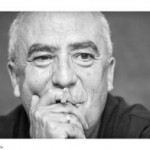 El Instituto Cervantes de Dublín y la editorial Olifante tienen el placer de presentarles hoy a las 18:00 en el Café Literario este recital poético del autor español Ángel Guinda, quién mostrará una proyección de videoclips sobre su poética (Arquitextura) y Manifiestos (Poesía útil, Antimanifiesto, Manifiesto No) además de videopoemas. A los audiovisuales les seguirá una lectura comentada por el propio autor y un coloquio. Presenta y conversa con el autor, Jennifer Wood (NUI Maynooth)
El Instituto Cervantes de Dublín y la editorial Olifante tienen el placer de presentarles hoy a las 18:00 en el Café Literario este recital poético del autor español Ángel Guinda, quién mostrará una proyección de videoclips sobre su poética (Arquitextura) y Manifiestos (Poesía útil, Antimanifiesto, Manifiesto No) además de videopoemas. A los audiovisuales les seguirá una lectura comentada por el propio autor y un coloquio. Presenta y conversa con el autor, Jennifer Wood (NUI Maynooth)
Ángel Guinda (Zaragoza, 26 de agosto de 1948) es un escritor español conocido sobre todo por su poesía, aunque su obra abarca géneros muy variados: artículos en periódicos y revistas, ensayos y traducciones. Fundó la Colección Puyal de libros de poesía en 1977 y la revista Malvís en 1988. Ha publicado más de una veintena de libros y es coautor de la letra del Himno de Aragón. En 2010 fue galardonado con el Premio de las Letras Aragonesas.
Ángel Guinda dará una charla en la Universidad de Maynooth el martes 23 de octubre a las 17:00 h.
Instituto Cervantes Dublin and Olifante Publishing House are delighted to present this poetry recital today at 6pm at Café Literario by Spanish author Ángel Guinda. He will screen a series of video clips about his poetry (“Arquitextura”) and Manifestos (“Poesía útil”, “Antimanifiesto”, “Manifiesto No”) as well as video poems. The videos will be followed by a recital with comments by the author and a Q&A session. Introuced by Jennifer Wood (NUI Maytnooth)
Ángel Guinda (Zaragoza, August 26th, 1948) is a Spanish writer known mainly for his poetry, although his work extends to various genres: newspaper and magazine articles, essays and translations. He founded the Colección Puyal of poetry books in 1977 and the Malvís magazine in 1988. He has published over twenty books and is the co-author of the lyrics to the Aragón anthem. In 2010 he received the award Premio de Letras Aragonesas.
Ángel Guinda will offer a lecture at the University of Maynooth in October 23rd, at 5 pm.
Audiolibro de la semana | Audiobook of the Week: Lo que me queda por vivir
La popular escritora y periodista Elvira Lindo es la autora de la novela Lo que me queda por vivir. Esta semana os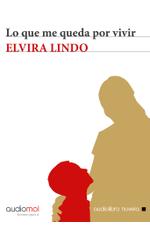 recomendamos que disfrutéis de esta obra a través de nuestro servicio de audiolibros. Si todavía no sabes como utilizarlo verás que es muy fácil, solo necesitas tu carnet de la biblioteca y hacer click aquí.
recomendamos que disfrutéis de esta obra a través de nuestro servicio de audiolibros. Si todavía no sabes como utilizarlo verás que es muy fácil, solo necesitas tu carnet de la biblioteca y hacer click aquí.
Antonia tiene veintiséis años cuando se ve sola con un niño de cuatro en el cambiante Madrid de los ochenta. La suya es la historia de un viaje interior y la crónica de un aprendizaje, el de una mujer que se enfrenta a la juventud y a la maternidad mientras intenta hacerse un lugar en la vida, en una ciudad y en una época de tiempo acelerado, más propicio a la confusión que a la certeza, sobre todo para alguien que ha tenido una experiencia demasiado temprana de la pérdida y de la soledad.
The popular writer and journalist Elvira Lindo is the author of the novel Lo que me queda por vivir. This week we recommend you to enjoy this work through our audiobook downloading service. If you still don´t know how to use it, you can see how easy it is, you just need your library card and make click here.
Antonia is 26 years old when she finds herself with a four year old in a changing Madrid during the 80s. It is the story of an inner journey and the chronicle of a learning process, the one experienced by a woman who faces youth and motherhood while she tries to find her place in life and in a city during fast times. A time more suitable for confusion than for certainty, specially for someone who has lived loss and loneliness too soon.
Taller: El aceite de oliva: cultura, ciencia y gastronomía / Workshop: Olive oil: culture, science and cuisine
 ¿Sabías que en 2010 la UNESCO declaró la dieta mediterránea patrimonio inmaterial de la humanidad? ¿Y cuál es uno de sus ingredientes esenciales? El aceite de oliva.
¿Sabías que en 2010 la UNESCO declaró la dieta mediterránea patrimonio inmaterial de la humanidad? ¿Y cuál es uno de sus ingredientes esenciales? El aceite de oliva.
Si tienes tu reserva, ven hoy a las seis a disfrutar de este taller-cata organizado por el Instituto Cervantes para todo tipo de público. En él podrás aprender más sobre su producción, sus características, sus propiedades gastronómicas, sus beneficios para la salud o los últimos avances científicos con los que está relacionado, además de probar tres diferentes clases de aceite de oliva.
Desde la antigüedad, el aceite de oliva u “oro líquido”, como lo llamaba Homero, ha estado presente en la vida del ser humano y a lo largo de la historia no se ha empleado únicamente como condimento que enriquece los alimentos sino que también ha tenido usos medicinales, religiosos, cosméticos o industriales.
Las últimas investigaciones científicas relativas a la salud nos dicen que son los aceites con mayores niveles de grasas mono-insaturadas y que el consumo de dos cucharadas diarias reduce el riesgo de padecer enfermedades cardiovasculares. Además son ricos en antioxidantes y tiene otros muchos efectos beneficiosos sobre la salud.
SRC: reservas.dublin@cervantes.es
Este taller forma parte de Innovation Dublin 2012, que se celebra en Dublín del 15 al 26 de octubre. El festival demuestra la capacidad de Dublín de inspirar, interactuar e innovar.
Did you know that UNESCO declared Mediterranean diet as intangible cultural heritage in 2010? And what is one of its essential ingredients? Olive oil.
If you have a reservation, come today at 6pm and enjoy this tasting workshop organized by the Cervantes Institute for all types of people. Here you can learn more about its production, characteristics, culinary properties, health benefits or the latest scientific advances related to it, as well as taste the three different types of olive oil.
Since ancien times, olive oil or “the golden liquid”, as Homer called it, has been present in human lives and has not only served as seasoning to enrich food but has also had medicinal, religious, cosmetic and industrial uses.
The latest health related scientific research has shown that these oils have the highest levels of monounsaturated fats and that the consumption of two daily spoonfuls reduces the risk of cardiovascular diseases. In addition to that, they are rich in antioxidants and have many more beneficial effects on health.
RSVP: reservas.dublin@cervantes.es
This workshop is part of Innovation Dublin 2012, which takes place across Dublin from Oct 15th -26th. The festival demonstrates Dublin’s capacity to inspire, interact and innovate.
